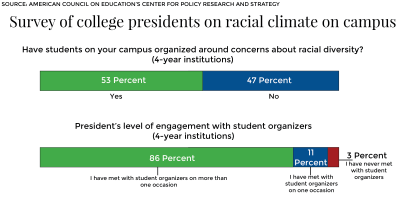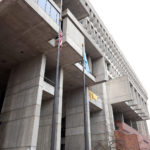 The American Council on Education’s Center for Policy Research and Strategy found college presidents to have significantly increased on-campus awareness of discussions revolving racial diversity, according to a Tuesday survey.
The American Council on Education’s Center for Policy Research and Strategy found college presidents to have significantly increased on-campus awareness of discussions revolving racial diversity, according to a Tuesday survey.
“Similar to demonstrations in the 1960s — perhaps the last time higher education has seen student activism at the current scale — students have targeted their messages toward campus leaders; namely, college and university presidents and other senior administrators,” the survey stated. “We know less about the experiences and perceptions of those at the helm of our nation’s postsecondary institutions.”
Forty-seven percent of surveyed presidents responded that students at their respective four-year universities have organized around issues related to racial diversity. Other high-profile activism, noted in the survey as relating to issues such as immigration and Islamophobia, has also increased campus-wide dialogue on the issues, 75 percent of four-year university presidents and 62 percent of two-year university presidents responded in the survey.
In both two-year and four-year higher education institutions, the results of the survey showed that 76 percent of responding presidents reported to have produced initiatives to increase diversity among students, faculty and staff, while 47 percent of presidents reported to have made actual policy changes.
The survey gathered data from 567 surveyed college and university presidents. Seventy-seven percent of them are leaders of four-year institutions, while 23 percent of them lead two-year institutions.
Boston University has hosted many events surrounding racial tension on campus, including a recent panel with a Black Lives Matter activist, The Daily Free Press reported Feb. 19. A dialogue also stemmed from a major protest in Downtown Boston last year, The Daily Free Press reported Jan. 20, 2015.
BU President Robert Brown emailed a letter of inclusion on Dec. 2, 2015 that addressed the racial climate on campus, including protests, discussions and other forms of activism that have become a reminder of a remaining challenge that needs to be tackled.
“As a university, we have a special obligation to take on difficult and complex challenges,” the letter stated. “The creation of a community that recognizes and respects all of our students, faculty, and staff is no exception to this obligation.”
BU spokesperson Colin Riley acknowledged that the administration and student groups have had and continue to have constructive meetings and conversations regarding BU’s racial climate.
“The university works hard to have a welcoming and inclusive environment,” Riley said. “We want to understand people’s experiences, and we value those conversations.”
Riley also enunciated the importance of Dean of Students Kenneth Elmore’s role as a liaison between the student body and senior administration in addition to being a person to whom students can go to discuss issues on campus.
“[Racial diversity] is an important discussion,” Riley said. “We really appreciate the input and feedback that we get from a host of different groups involved in these discussions.”
Several students said they agreed with the findings of the survey and commended the university administration for making progress in addressing important issues.
Caitlin Connelly, a sophomore in the College of Arts and Sciences, said though she is aware of different forms of campus activism, she is most familiar with the administration’s handling of students’ effort to push for fossil fuel divestment.
“I’ve heard of [Brown] doing a lot,” Connelly said. “He has been meeting with [student advocates for fossil fuel divestment]. Activism is a big part of students’ everyday lives here, and I think that that’s highly prevalent at BU.”
Lauren May, a freshman in the College of Engineering, echoed the survey’s findings and said she agrees that the discourse caused by college activism across the nation is influencing policy changes at BU.
“All the recent activism from students has probably influenced [Brown] to make changes, [and] not just BU, but everywhere else,” she said. “[Sending] the emails right now, he’s kind of passively doing it. If students want something … the students have to react first and then he will change something.”
Devin Harvin, a freshman in CAS, agreed with May’s opinion of Brown’s emailed letters to the BU community. However, Harvin said Brown has been making “slow and steady” strides to increase diversity and referred to the university’s initiative to increase faculty diversity.
“If we saw his face or if he was giving some type of speech about whatever he was trying to promote, then it would definitely have a bigger impact,” he said. “He’s trying to move along with the time and make decent strides.”


